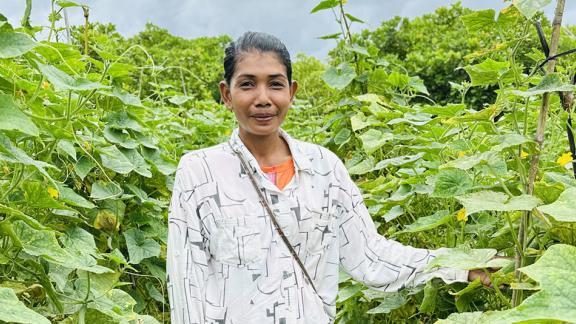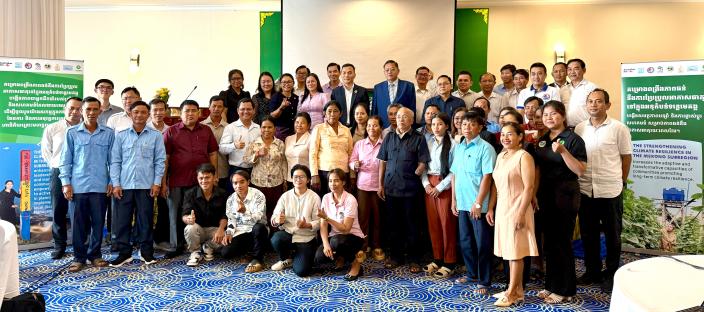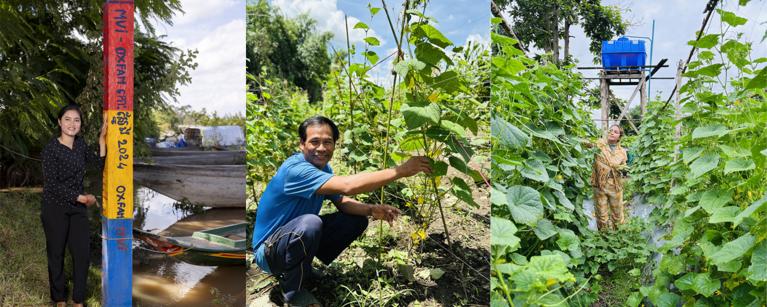A three-year project concludes, leaving a legacy of empowered local leadership, innovative solutions, and a scalable blueprint for climate adaptation.
Phnom Penh, 26 August 2025_For communities along the Mekong River, climate change is not a future threat, it is a daily reality. From unpredictable floods to prolonged droughts, riverine families have long been on the frontlines. But a powerful shift is underway. After 42 months of dedicated implementation, the "Strengthening Climate Change Resilience (SCR) in the Mekong Sub-region" project is concluding, having successfully transformed the role of local communities from vulnerable recipients to active leaders of their own climate-smart future.
Funded by the Australian Department of Foreign Affairs and Trade (DFAT), and implemented by Oxfam in collaboration with our partners, the Fisheries Action Coalition Team (FACT), My Village (MVi), Northeastern Rural Development (NRD), 3S Rivers Protection Network (3SPN), the project hosted its Wrap-Up and Learning Workshop on August 26, 2025, to consolidate and share the valuable lessons learned with a wider audience of practitioners, policymakers, and development partners.
The project’s most significant achievement is its demonstrable, community-led model for building resilience. Operating across 11 villages in Ratanakiri, Stung Treng, and Kratie provinces, the project directly engaged 4,322 individuals, placing a strong emphasis on the strengthening leadership of 90 Village Disaster Management Group (VDMG) members 23% of whom are women and 19% from indigenous communities to lead local DRM planning and response.
“The real success story here is one of ownership,” said Ms. Sophoan Phean, National Director of Oxfam in Cambodia. “We didn’t bring in outside solutions. We empowered the people who know their land and rivers best, the local communities, to design and drive their own strategies. This ensures sustainability long after the project ends.”
"We have witnessed the power of partnership in building community resilience to disaster risks and climate change throughout the entire Mekong region," said H.E. Kimhong Prak, Deputy Secretary General, National Committee for Disaster Management (NCDM).
"The project has brought about meaningful and life-changing achievements for our people, especially for the communities in the remote areas who are vulnerable to disasters," H.E. Serey Sou, Deputy Governor of Ratanakiri Province.
This empowerment was channeled through the strengthening of 11 Village Disaster Management Groups (VDMGs) and 4 Commune Committees for Disaster Management (CCDMs). These groups, inclusive of women, youth, and marginalized community members, became the engine rooms for developing and executing practical Disaster Risk Management (DRM) and Climate Change Adaptation (CCA) plans.
The project facilitated tangible, on-the-ground innovations that are already improving lives in several meaningful ways. Community access to critical hydro-meteorological data was expanded through the Early Warning System 1294 and community-based water level monitoring. This data was translated into information boards and broadcasted via mobile loudspeakers, transforming it into life-saving tools that help disseminate hazards and disaster risks to vulnerable group.
In the realm of climate-smart agriculture, 28 households piloted solar-powered irrigation systems and adopted other resilient farming techniques. These innovations have significantly boosted household income and food security while helping communities adapt to climate-related risks.
To promote inclusive water security, a new solar-powered water supply system was installed, providing reliable access to clean water for 66 indigenous Kroeung community members, including 8 people with disabilities.

Chuon Theary, a 38-year-old smallholder farmer from Kaeng San village. Photo: Soknak Por/Oxfam
Ms. Chuon Theary, a 38-year-old smallholder farmer from Kaeng San village in Ratanakiri province, spent years relying on traditional farming methods alongside her husband. They faced income instability and uncertainty making it difficult for them to support their family of four, including two school-aged children.
"Before, I couldn’t afford to send my elder daughter to school regularly. Now, I can support both of my children’s education," said Ms. Chuon Theary, when reflecting on the changes.
The Dal (Phnom) village, also in Ratanakiri province, 243 indigenous Jarai people faced chronic water insecurity after being displaced by flooding caused by a dam. Women and girls bore the heaviest burden, spending hours each day walking long distance to collect water.
“The solar pump supported by the project means I no longer need to walk far for water. It’s easier now for everyone.”
Beyond the community level intervention, the project adopted an evidence-based approach that contribute meaningfully to national policy development contributing to the Cambodia Climate Change Strategic Plan 2024–2033, the Nationally Determined Contribution (NDC) 3.0, and the Gender Mainstreaming Strategy 2026–2030.
The Wrap-Up and Learning Workshop of the project was held to harvest the rich insights from this journey. The event provided a platform for community representatives, local authorities, and national partners to reflect on accomplishments, co-create solutions for future interventions, and solidify a common framework for climate resilience that can be scaled across the Mekong and other beyond.
The project stands as a testament to the power of inclusive partnership between communities, civil society (FACT, MVI, NRD, 3SPN), academic institution like the Royal University of Agriculture (RUA) and government bodies like the National Committee for Disaster Management (NCDM) and its sub-national structures. This proved that with the right support, those most affected by climate change can become their most effective architects.

Group photo during the closing and reflection workshop of the Strengthening Climate Resilience in the Mekong Sub-Region project on 26 August 2025. Photo: Oxfam
